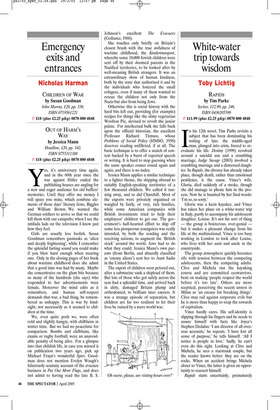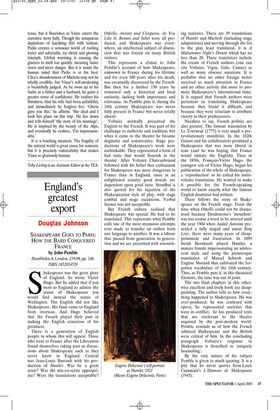White-water trip towards wisdom
Toby Lichtig
RAPIDS by Tim Parks Secker, £12.99, pp. 246, ISBN 0436205599 ✆ £11.99 (plus £2.25 p&p) 0870 800 4848 In his 12th novel, Tim Parks revisits a subject that has been dominating his writing of late: the middle-aged man, plunged into crisis, forced to reevaluate his life. Destiny (1999) revolved around a suicidal son and a crumbling marriage, Judge Savage (2003) involved a crumbling marriage and a distressed daughter. In Rapids, the divorce has already taken place, though death, rather than emotional pestilence, is the cause. Vince’s wife, Gloria, died suddenly of a stroke, though she did manage to phone him in the process. Now he is haunted by her final words: ‘I’m so, so sorry.’ Gloria was a keen kayaker, and Vince has taken her place on a white-water trip in Italy, partly to accompany his adolescent daughter, Louise. It’s not his sort of thing — the group is boisterous, over-genial but it makes a pleasant change from his life at the multinational. Vince is too busy working in London to look after Louise, who lives with her aunt and uncle in the countryside.
The group atmosphere quickly becomes rife with tension between the competing adolescents, then the competing adults. Clive and Michela run the kayaking course and are committed ecowarriors, bent on making ‘people respect the world before it’s too late’. Others are more sceptical, perceiving the recent unrest in Milan as ‘an excuse for breaking things’. Clive may rail against corporate evils but he is more than happy to reap the rewards of capitalism.
Vince hardly cares. His self-identity is slipping through his fingers and he needs to assure himself with facts like Joyce’s Stephen Dedalus: ‘I am director of all overseas accounts,’ he repeats. ‘I have lost all sense of purpose,’ he tells himself. ‘All I notice is people in love.’ Sadly, he can’t even do this right. Looking at Clive and Michela, he sees a starstruck couple, but the reader knows better: they are on the rocks. When an accident brings Michela closer to Vince, the latter is given an opportunity to reassert himself.
Rapids starts uncertainly, prematurely tense, but it flourishes as Vince enters the narrative more fully. Though the scrupulous depictions of kayaking flirt with tedium, Parks creates a sensuous world of rushing water and adrenalin, icy shock and glowing triumph. Global warming is causing the glaciers to melt too quickly, meaning faster rivers and more danger. But it is inside the human mind that Parks is at his best. Clive’s abandonment of Michela may not be wholly credible, but Vince’s self-awakening is beautifully judged. As he owns up to his faults as a father and a husband, he gains a greater sense of confidence. He realises his blindness, that his wife had been unfaithful, and immediately he forgives her. ‘Gloria gave you this,’ he affirms. ‘She died and I took her place on this trip’. He lies down and tells himself ‘the story of his marriage’. He is inspired by the beauty of the Alps, and eventually he realises, ‘I’m impressionable.’ It is a touching moment. The fragility of the natural world is great cause for concern, but it is precisely vulnerability that makes Vince so gloriously human.
Toby Lichtig is an Assistant Editor at the TLS.






























































 Previous page
Previous page